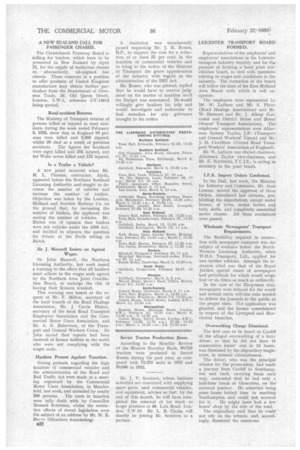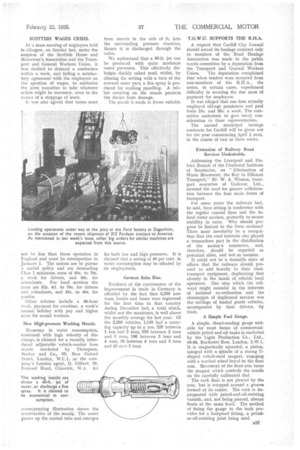A NEW ZEALAND CALL FOR PASSENGER CHASSIS.
Page 40

Page 41

If you've noticed an error in this article please click here to report it so we can fix it.
The Christchurch Tramway Board is calling for tenders, which have to be presented in New Zealand by -April 22, for the supply of trolleybus chassis or, •• alternatively, oil-engined bus chassis. •Those concerns in a position to offer products of United Kingdom manufacture may Obtain further particulars from the Department of Overseas Trade, 35, Old Queen Street, London, S.W.1-, reference GY.14813 being quoted.
Road-accident Returns.
The Ministry of Transport returns of persons killed or injured in road •accidents during the week ended February 9, 1935, show that in England 86 persons were killed and 2,859 injured, whilst 26 died as a result of previous accidents. The figures for Scotland were eight killed and 285 injured, and for Wales seven killed and 122 injured.
Is a Trailer a Vehicle?
A new point occurred when Mr. M. L. Thomas, contractor, Alyth, appeared before the Northern Scotland Licensing Authority and sought to decrease the number of vehicles and increase the number of traders. Objection was taken by the London, Midland and Scottish Railway Co. on the ground that, by increasing the number of trailers, the applicant was. raising the number of vehicles. Mr. Riches was of opinion that trailers were not vehicles under the 1933 Act,. and decided to adjourn the question for debate at the Perth sitting in March.
Sir J. Maxwell Insists on Agreed Wages.
Sir John Maxwell, the Northern Licensing Authority, last week issued a warning to the effect that all hauliers must adhere to the wages scale agreed by the Northern Area Joint Conciliation Board, or undergo the risk of having their licences revoked.
This warning was issued at the request of Mr. F. Milton, secretary of the local branch of the Road Haulage Association, Mr. J. Currie Blakey, secretary of the local Road Transport Employers Association and the Commercial Motor Users Association, and Mr. A. R. Robertson, of the Transport and General Workers Union. Sir John stated that reports had been received of licence holders in the north who were not complying with the wages scale.
Hauliers Protest Against Taxation.
Strong protests regarding the high taxation of commercial vehicles and the administration of the Road and Rail Traffic Act were made at a meeting organized by the Commercial Motor Users Association, in Macclesfield, last week, and attended by nearly 200 persons. The costs in taxation were fully dealt with by Councillor Howard Robinson, whilst the restrictive effects of recent legislation were. thesubject of an address by Mr. W. E. Macve (Bleachers Association}.
A resolution was unanimously passed requesting Mr. J. R. Rcmer, M.P., to support the case for a reduction of at least 25 per cent, in the taxation of commercial vehicles and to bring to the notice of the Minister of Transport the grave apprehension of the industry with regard to the administration of the 1933 Act.
Mr. Remer, who was present, replied that he would have to reserve judgment on the matter of taxation until the Budget was announced. He would willingly give hauliers his help and would investigate and endeavour to find remedies for any grievance brought to his notice.
Soviet Tractor Production Soars.
According to the Monthly Review of the Moscow Natality Bank, 90,729 tractors were produced in Soviet Russia during the past year, as compared with 73,370 units in 1933 and 50,640 in 1932.
Mr. J. V. Scottorn, whose business activities are concerned with supplying spare parts, used commercial vehicles, and equipment, advises us that, by the end of this month, he will have completed the removal of his stock to larger premises at 88, Lots Road, London, S.W.10. Mr. L. B. Clarke will shortly be joining Mr. Scottorn as a partner.
LEICESTER TRANSPORT BOARD FORMED.
Representatives of the employers' and employees' associations in the LeiCestet transport industry recently met for fly.: purpose of forming a local joint conciliation board, to deal with questions relating to wages and conditions in the industry. The formation of the board will follow the lines of the East Midland Area Board with which it will cooperate.
The employers were represented by W. Latham and Mr. S. Platts (Road Haulage Association) and Mi. W. Burrows and Mr. J. Allsop (Lei-' cester and District Horse and Motor' OWners' Transport Association). The' employees' representatives were Alderman Sydney Taylor, J.-P. (Transport, and General Workers' Union) and Mr. J. H. Cawthorn (United .Road Transport Workers' Association of England).• Mr. W. Latham was elected chairman, Alderman Taylor vice-chairman, anti Mr. E. Northfold, F.C.I.S., is acting as secretary to the joint' board.
I .F .S . Import Orders Confirmed.
In the Dail, last week, the Minister for Industry and Commerce, Mr. Sean Letnass, moved the approval of three Orders, introduced last autumn, pro-, hibiting the importation, except under licence, of tyres, motor bodies and body shells, and completely assembled motor chassis. All three resolutions were passed.
'Wholesale Newsagents' Transport Requirements.
The flexibility required in connection with newspaper transport was the subject of evidence before the NorthWestern Licensing Authority, when W.H.S. Transport, Ltd., applied for two further vehicles. Amongst the in. stances cited was that of the Royal Jubilee, special issues of newspapers -and periodicals for which would weigh four or six times as much as ordinarily.
In the case of the Hauptman trial, newspapers were delayed for the result and several extra vehicles were needed to deliver the journals to the public at the, proper time. The application was granted, and the licence consolidated in respect of the Liverpool and. Manchester branches.
Overworking Charge Dismissed.
The first case -to be heard at Cardiff of the alleged overworking of a lorry driver, so that he did not have 10 consecutive hours' rest in 24 hours, was dismissed by the stipendiary magistrate, in unusual circumstances.
The driver, who was the principal witness for the prosecution, had made a journey from Cardiff to Southampton and back, carrying loads each way, contended that he had only a half-hour break at Gloucester, on the' outward journey. He admitted being some hours behind time in reaching Southampton and could not account for it. He might have had a few hours' sleep by the side of the road.
The stipendiary said that he could , not rely on the witness, and, accordingly, dismissed the summons. SCOTTISH WAGES CRISIS.
At a mass meeting of employees held in Glasgow, on Sunday last, under the auspices of the Scottish Horse and Motormen's Association and the Transport and General Workers Union, it was decided to demand a conference within a week, and failing a satisfactory agreement with the employers on the question of wages, to authorize the joint executive to take whatever action might be necessary, even to the extent of -a stoppage of work.
It was also agreed that terms must not he less than those operative in England and must be retrospectiye to January 1. The unions are to pursue a united poliCy and are demanding Class I minimum rates of 60s. to 70s. a week for driven, and 56s. for .attendants. For local services the rates are 62s. 6d. to 70s. for drivers and attendants, and 35s. to 40s, for youths.
Other reforms include a 48-hour week, payment for overtime, a week's annual holiday with pay and higher rates for casual workers.
New High-pressure Washing Nozzle.
Economy in water consumption, combined with high velocity of discharge, is claimed for a recently introduced adjustable vehicle-washer hose nozzle marketed by Thompson, Barker and Co., 59, New Oxford Street, London, W.C.1, or the company's London agent, D. Gilbert, 79, Esmond Road, Chiswick,' W.4. An accompanying illustration shows the construction a the noz71e. The water passes up the central tube and emerges
from outlets in the side of it, into the surrounding pressure chamber, thence it is discharged through the valve.
We understand that a 40-ft. jet can be produced with quite moderate water pressures. This effectively dislodges thickly caked mud, whilst, by altering the setting with a turn of the screwed outer part, a fine spray is produced for washing panelling. A rubber covering on the nozzle protects the device from damage.
The nozzle is made in forms suitable
for both low and high pressures. It is claimed that a saving of 40 per cent, in water consumption may be effected by its employment.
German Sales Rise.
Evidence of the continuance of the improvement in trade in Germany is ailorded by the fact that 2,298 new vans, lorries and buses were registered for the first time in that country during December last, a total which, whilst not the maximum, is well above. the monthly average for last year. Of the 2,298 vehicles, 1,148 had a carrying capacity up to a ton, 329 between 1 ton and 2 tons, 556 between 2 tons and 3 tons, 186 between 3 tons and 4 tons, 36 between 4 tons and 5 tons and 43 over 5 tons.
T.G.W.U. SUPPORTS THE R.H.A.
A request that Cardiff City Council should award its haulage contract only to members of the Road Haulage Association was made to the public works committee by a deputation from the Transport and General Workers
Union. The deputation complained that when tenders were accepted from non-members of . the R.H.A., the union, in certain cases, experienced difficulty in securing, the due rates of payment for employees.
It was alleged that one firm actually employed old-age pensioners and paid them 25s. and 30s. a week. The committee undertook to give every consideration to these representations.
The annual municipal haulage contracts for Cardiff will be given out for the year commencing April 1 next, in the course of two or three weeks, Extension of Railway Road Services Undesirable.
Addressing the Liverpool and District Branch of the Chartered Institute of Secretaries, on "Elimination of Waste Movement, the Key to Efficient Transport," Mr. W. A. Winson, transport executive of Unilever. Ltd., stressed the need for greater collaboration between the four main forms of transport.
For some years the railways had, he said, been sitting in conference with the regular coastal lines and the inland water carriers, primarily to secure stability in rates. Why should progress be limited to the three sections? There must inevitably he a recognition that the road interests also played a tremendous part in the distribution of the nation's commerce, , and, therefore, should be regarded as potential allies, and not as enemies.
It could not be a desirable state of affairs that the railways should proceed to add heavily, to their roadtransport equipment, duplicating that already in the hands of reliable local operators. One step which the railways might consider in the interests of national co-ordination and the elimination of duplicated services was the carriage of loaded goods vehicles, accompanied by their drivers, by train.
A Simple Fuel Gauge.
A simple, direct-reading gauge suitable for most forms of commercialvehicle petrol and oil tanks is marketed by the Light Production Co., Ltd., 60-66, Rochester Row, London, S.W.1. It is magnetically operated, a pinion, integral with a spindle of a strong Ushaped cobalt-steel magnet, engaging with a toothed wheel keyed to the float arm. Movement of the float arm turns the magnet which controls the needle on the carefully calibrated dial.
The cork float is not pierced by the arm, but is wrapped around a groove formed at its centre. The cork is impregnated with petrol-and-oil-resisting varnish, and, not being pierced, always floats at the same level. The method of fixing the gauge to the tank provides for a lealcproof fitting, a petrol or-oil-resisting .joint being used. ,




































































































